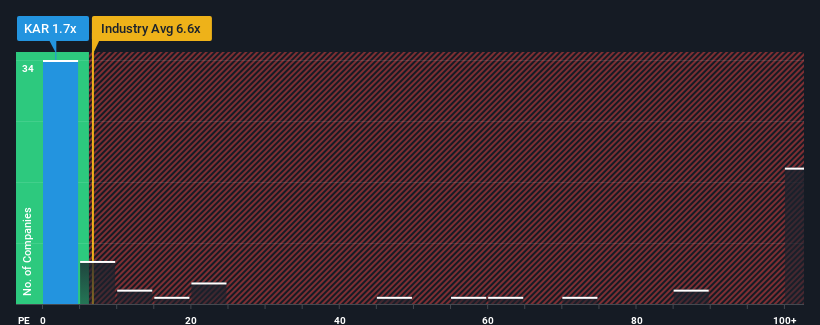- Australia
- /
- Oil and Gas
- /
- ASX:KAR
Investors Don't See Light At End Of Karoon Energy Ltd's (ASX:KAR) Tunnel
You may think that with a price-to-sales (or "P/S") ratio of 1.7x Karoon Energy Ltd (ASX:KAR) is definitely a stock worth checking out, seeing as almost half of all the Oil and Gas companies in Australia have P/S ratios greater than 6.6x and even P/S above 214x aren't out of the ordinary. Nonetheless, we'd need to dig a little deeper to determine if there is a rational basis for the highly reduced P/S.
Check out our latest analysis for Karoon Energy

How Karoon Energy Has Been Performing
With revenue growth that's inferior to most other companies of late, Karoon Energy has been relatively sluggish. It seems that many are expecting the uninspiring revenue performance to persist, which has repressed the growth of the P/S ratio. If this is the case, then existing shareholders will probably struggle to get excited about the future direction of the share price.
Keen to find out how analysts think Karoon Energy's future stacks up against the industry? In that case, our free report is a great place to start.What Are Revenue Growth Metrics Telling Us About The Low P/S?
There's an inherent assumption that a company should far underperform the industry for P/S ratios like Karoon Energy's to be considered reasonable.
Taking a look back first, we see that the company grew revenue by an impressive 47% last year. Although, its longer-term performance hasn't been as strong with three-year revenue growth being relatively non-existent overall. Therefore, it's fair to say that revenue growth has been inconsistent recently for the company.
Turning to the outlook, the next three years should generate growth of 8.2% each year as estimated by the seven analysts watching the company. That's shaping up to be materially lower than the 397% per year growth forecast for the broader industry.
With this information, we can see why Karoon Energy is trading at a P/S lower than the industry. It seems most investors are expecting to see limited future growth and are only willing to pay a reduced amount for the stock.
The Key Takeaway
Typically, we'd caution against reading too much into price-to-sales ratios when settling on investment decisions, though it can reveal plenty about what other market participants think about the company.
We've established that Karoon Energy maintains its low P/S on the weakness of its forecast growth being lower than the wider industry, as expected. Shareholders' pessimism on the revenue prospects for the company seems to be the main contributor to the depressed P/S. It's hard to see the share price rising strongly in the near future under these circumstances.
Before you settle on your opinion, we've discovered 3 warning signs for Karoon Energy (2 are concerning!) that you should be aware of.
Of course, profitable companies with a history of great earnings growth are generally safer bets. So you may wish to see this free collection of other companies that have reasonable P/E ratios and have grown earnings strongly.
Valuation is complex, but we're here to simplify it.
Discover if Karoon Energy might be undervalued or overvalued with our detailed analysis, featuring fair value estimates, potential risks, dividends, insider trades, and its financial condition.
Access Free AnalysisHave feedback on this article? Concerned about the content? Get in touch with us directly. Alternatively, email editorial-team (at) simplywallst.com.
This article by Simply Wall St is general in nature. We provide commentary based on historical data and analyst forecasts only using an unbiased methodology and our articles are not intended to be financial advice. It does not constitute a recommendation to buy or sell any stock, and does not take account of your objectives, or your financial situation. We aim to bring you long-term focused analysis driven by fundamental data. Note that our analysis may not factor in the latest price-sensitive company announcements or qualitative material. Simply Wall St has no position in any stocks mentioned.
About ASX:KAR
Karoon Energy
Operates as an oil and gas exploration and production company in Brazil, the United States, and Australia.
Very undervalued with adequate balance sheet.
Similar Companies
Market Insights
Community Narratives




